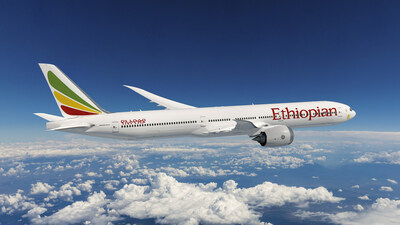ADDIS ABABA, Ethiopia, March 5, 2024 /PRNewswire/ -- Boeing [NYSE: BA] and Ethiopian Airlines announced today an agreement for the East African airline to purchase eight 777-9 passenger airplanes and the potential for up to 12 additional jets.
Ethiopian Airlines' selection of 777-9 jets positions the carrier as the first 777X customer in Africa and builds on its landmark 2023 order for 11 787 Dreamliner and 20 737 MAX airplanes to modernize and grow its fleet.
"We are pleased to continue setting the trend in African aviation by adopting cutting-edge technologies to enhance our services and customer satisfaction. Improving our operational performance and commitment to environmental sustainability, the 777-9 offers more flexibility, reduced fuel consumption and carbon emissions," said Ethiopian Airlines Group CEO Mr. Mesfin Tasew. "We are grateful to Boeing for their long-standing partnership and support, and we eagerly anticipate flying the 777-9 across the African skies and beyond."
Based on the 777 and with advanced technologies from the 787 Dreamliner family, the 777-9 features new carbon-fiber composite wings and engines that will enable the airplane to achieve 10% better fuel efficiency and operating costs than the competition. The 777-9 will support Ethiopian Airlines' plans to grow and renew its fleet in size, range and passenger and cargo capacity to reach high-demand markets in Africa, Asia, Europe and North America.
"Ethiopian Airlines marks yet another first in our longstanding partnership by selecting the 777-9 to be the flagship of its growing fleet," said Brad McMullen, Boeing senior vice president of Commercial Sales and Marketing. "Building on a relationship that goes back 75 years, we deeply value the unwavering trust and confidence Ethiopian Airlines puts in our airplanes."
Boeing airplanes make up more than half of Ethiopian Airlines' current fleet, including 29 787 Dreamliners, 20 777s, three 767s, 27 Next-Generation 737s and 15 737 MAX jets. Ethiopian Airlines and Boeing continue to explore opportunities to further develop the country's aerospace industry, including support for Ethiopian Airlines' MRO capabilities, industrial development, training capabilities at the Ethiopian Aviation University and STEM education, as well as equipping the Ethiopian Museum of Science with aerospace exhibits.
Boeing's Commercial Market Outlook forecasts Africa's annual air traffic growth at more than 7% through 2042 ─ the third-highest growth rate among global regions and above the global average of approximately 6%. Providing growth opportunities for airlines and offering enhanced features for passengers, with a range of 13,510 km (7,295 nautical miles), the 777-9 enables flights from Addis Ababa to as far as Seattle in the U.S.
About Boeing
As a leading global aerospace company, Boeing develops, manufactures and services commercial airplanes, defense products and space systems for customers in more than 150 countries. As a top U.S. exporter, the company leverages the talents of a global supplier base to advance economic opportunity, sustainability and community impact. Boeing's diverse team is committed to innovating for the future, leading with sustainability, and cultivating a culture based on the company's core values of safety, quality and integrity. Join our team and find your purpose at boeing.com/careers.
About Ethiopian
Ethiopian Airlines Group (Ethiopian) is the fastest-growing airlines brand globally and the continent's largest airline brand. In its seventy-seven years of successful operations, Ethiopian, the fastest growing airline, has become one of the continent's leading carriers, unrivalled in efficiency and operational success. In addition to its main hub in Addis Ababa, Ethiopia, it is also pursuing its multi-hub strategy through a hub in Lomé, Togo with ASKY, in Lilongwe, Malawi with Malawi Airlines and in Lusaka, Zambia with Zambia Airways. Ethiopian commands the lion's share of the African passenger and cargo network operating the youngest and most modern fleet to more than 150 domestic and international passenger and cargo destinations across five continents. Ethiopian's fleet category consists of ultra-modern and environmentally friendly aircraft such as Boeing 737s, 777s, 787s, Airbus A350-900 and Bombardier Dash 8-400 double cabin with an average fleet age of seven years. In fact, Ethiopian is the first airline in Africa to own and operate most of these aircraft. Having achieved its strategic plan (Vision 2025) ahead of time, Ethiopian is currently implementing a 15-year strategic plan called Vision 2035 that will see it become one of the top 20 most competitive and leading aviation groups in the world by providing safe, secured, market driven and customer focused Passenger and Cargo Transport and Logistics, Aviation Training, Airport Management and Ground Services, MRO and Aerospace Manufacturing and Travel and Tourism Services. As a multi-award-winning airline, Ethiopian has been the champion in various coveted awards including Skytrax's 'Best Airline in Africa Award' for six consecutive years among others. The airline has been a Star Alliance member since 2011 and has been registering more than threefold growth in the past 10 years. For more at: www.ethiopianairlines.com
Contact
Nadine Fanous
+971-56-422-9051
nadine.fanous@boeing.com
Boeing Media Relations
media@boeing.com
Ethiopian Airlines
(251-11)517-8913/8165/8907
CorporateCommunication@ethiopianairlines.com
 View original content to download multimedia:https://www.prnewswire.com/news-releases/ethiopian-airlines-to-expand-widebody-fleet-with-up-to-20-boeing-777x-jets-302080091.html
View original content to download multimedia:https://www.prnewswire.com/news-releases/ethiopian-airlines-to-expand-widebody-fleet-with-up-to-20-boeing-777x-jets-302080091.html
SOURCE Boeing
![]() View original content to download multimedia:https://www.prnewswire.com/news-releases/ethiopian-airlines-to-expand-widebody-fleet-with-up-to-20-boeing-777x-jets-302080091.html
View original content to download multimedia:https://www.prnewswire.com/news-releases/ethiopian-airlines-to-expand-widebody-fleet-with-up-to-20-boeing-777x-jets-302080091.html






